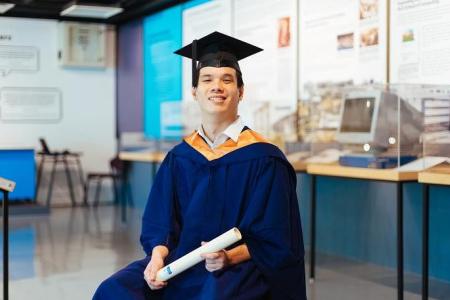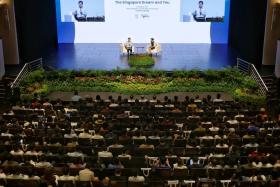NUS student with cerebral palsy graduates with honours
A trip to Bali, an exchange programme in Korea, friendships that blossomed over the years in school. These are but a few highlights of a fulfilling university life, in which Mr Ng Jun Kang thrived despite the challenges of cerebral palsy.
The 26-year-old, who studied computer science in the National University of Singapore (NUS), has cerebral palsy, caused by a brain injury during birth.
Mr Ng is among nearly 16,000 students graduating from the NUS Class of 2024 from July 11 to 21, having earned an honours degree in computer science with distinction.
“Nothing good comes easy,” he said, speaking to The Straits Times about the struggles he faced due to his disability.
As his condition affects muscle control, motor skills and speech, Mr Ng grapples with daily challenges, particularly tasks that require fine motor skills, such as walking and writing.
The start of his university life in coincided with the Covid-19 pandemic, which made it hard for him to find friends initially.
“It was quite unique, having everything online,” he said, recalling how most lessons were conducted for the first half of his university life.
“But at the end of the two-and-a-half year, I managed to make a few good friends through project work and classes.”
They showed him care and concern throughout his university life, he said. “They have been a great support to me, both in university and for the future.”
With this group of friends, he went to Hanyang University in Seoul for a month-long student exchange programme when in his second year, an experience he fondly likens to a holiday with friends.
“It was my first time travelling overseas with friends instead of my family, and it was so much fun,” Mr Ng said.
The same group also helped each other find internships and search for jobs.
Compared to his peers, Mr Ng said, he found presentations particularly challenging due to his speech impairment.
“Computer science did not have a lot of these, but when it came to electives, that’s when we had to do more public speaking,” he said, adding that he did not always get to choose the electives that better suited him due to the nature of the bidding system in NUS.
However, Mr Ng overcame these challenges through diligent practice, and also with the help of understanding professors, who were mindful of his difficulties with articulation.
He went on to graduate with a strong GPA, doing well in most of his modules.
He said that his attention to detail was crucial in his course, so he chose to delve deeper into understanding the content rather than just preparing for exams. “I think by doing that, it helped me to understand the subject more.”
He added: “I wouldn’t say I am a perfectionist, but I am a meticulous person. This has helped me to excel at what I do.”
His decision to study computing in NUS was a practical consideration, coming from Ngee Ann Polytechnic’s Electronic and Computer Engineering course, which he graduated from with a 3.9 GPA.
He had found certain polytechnic modules challenging, especially those that required him to use his hands to move small electronic parts.
“Exercises like these took me four hours, while my peers took only one.
“I think that made me realise my limitations – that I can’t touch the sky. I had to adjust my expectations accordingly,” he said, adding that this influenced his decision to pursue a field more suited to his abilities.
Mr Ng started working as a software engineer in Google in June, and is pursuing an online master’s degree in computer science at Georgia Institute of Technology.
He also plans to provide his parents with a good life, he said, which is a goal that has been a major source of his motivation.
“Family support was key throughout my years of studying,” Mr Ng said, recalling the warm home-cooked meals, help with some household tasks and emotional support he was given.
He recently brought his mother on a holiday to Hong Kong, as a gift to her.
Asked if he had any advice for persons with disabilities navigating university life, he recommended engaging with people – friends, family, and even strangers – to avoid social isolation, which can lead to paranoia or a narrow perspective.
He added: “Time is relative, so don’t feel pressured by others, take your time if you need. Don’t feel shackled just because you’re scared of how people will look at you.”
Get The New Paper on your phone with the free TNP app. Download from the Apple App Store or Google Play Store now


